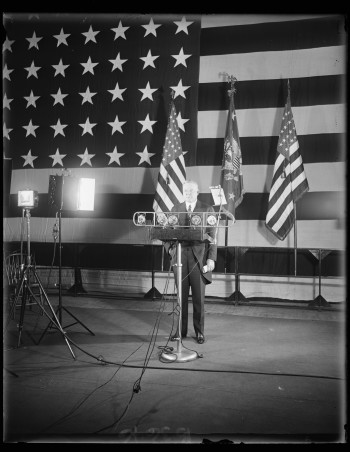
President Herbert Hoover presents his Armistice Day address at the American Legion Exercises in Washington, D.C., on Nov. 11, 1929. His message was relayed by radio through the United States and Europe. Courtesy of the Library of Congress, LC-DIG-hec-35570.
By Glen Jeansonne and David Luhrssen
Though Iowa native Herbert Hoover’s presidency (1929-1933) is synonymous with the Great Depression, Hoover’s domestic program does not fare as badly as is generally believed when compared with his successors.
Franklin D. Roosevelt’s (FDR) record is embellished by the myth that he ended the Great Depression. In reality, unemployment was higher in all but one of the first eight years of the New Deal than it was during the four years of the Hoover administration. In fact, it was World War II, or, more importantly, consumer spending after World War II, that permanently ended the Great Depression. The war broke the psychological gridlock that had paralyzed Americans and prevented them from spending or investing their money. Government spending alone to create jobs can never end a depression or a major recession in a capitalist economy because the jobs end when the project ends or when the appropriation expires.
Hoover correctly believed that the key to terminating the depression was not creating new, temporary, government jobs, but restoring old, permanent jobs. The New Deal jobs were no more permanent than the jobs that sent workers into munitions plants and soldiers overseas to battle the Axis. The Great Depression ended on Roosevelt’s watch, but Roosevelt did not end the Great Depression.
Beyond FDR, Hoover had a more integrated, comprehensive domestic program enacted than Presidents Harry Truman, Dwight Eisenhower, John F. Kennedy (JFK), Richard Nixon, Gerald R. Ford, Jimmy Carter and both Bushes (George H.W. and George W.). Truman’s Fair Deal cupboard was virtually barren of achievements. Eisenhower’s major successes, the Interstate Highway Act and the St. Lawrence Seaway, were both recommended by Hoover in the 1920s and 1930s. The domestic policy innovations of JFK, Nixon, Ford, Carter and both Bushes were all rather thin. Presidents Lyndon B. Johnson, Bill Clinton and Ronald Reagan made lasting marks domestically, although of them only Reagan left an impressive foreign policy legacy.
There are reasons Hoover’s legacy is relegated to the dustbin of history, some involving malice, but the greater sin is neglect. Although he led a fascinating life, the Great Depression dimmed his halo and the drumbeat of the 1932 election blaming him for being there when it happened, reverberates to the 21st century. As late as 2008, GOP candidate Sen. John McCain said that Hoover was the last president to raise taxes during hard times, forgetting that FDR did so twice and George H. W. Bush raised taxes after promising not to do so.
Part of Hoover’s problem is that it is difficult to categorize his ideology. If a conservative, he was an unusual one and a complicated man. Some of Hoover’s personal assets, which might draw praise in another profession, are political liabilities. He was neither colorful, charismatic, dramatic, nor a great orator before the masses. The fact that Hoover was a Quaker is more important than that JFK was a Catholic. The Quaker president did not find spirituality between the walls of a church but within the divine spark that Quakers call the “Inner Light.”
TO READ MORE ABOUT THIS STORY AND OTHER FASCINATING STORIES ABOUT IOWA HISTORY, subscribe to Iowa History Journal. You can also purchase back issues at the store.
